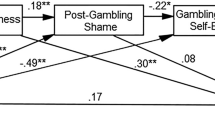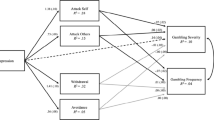Abstract
Despite often being considered equivalent affective states, shame and guilt have differential associations with problem gambling with only shame showing a strong positive association with problem gambling. However, little is known about the mechanisms underlying the shame-problem gambling association. Further, shame and guilt are associated with distinct coping strategies, with shame motivating maladaptive coping (e.g., avoidance, escape) and guilt motivating adaptive coping (e.g., taking corrective action). This study aimed to examine whether maladaptive coping motives for gambling mediate the relationship between shame, but not guilt, and gambling problems. Participants were 196 (126 male) regular gamblers who completed a same and guilt scale, the Problem Gambling Severity Index, and a modified Gambling Motives Questionnaire, which assessed individual motives to engage in gambling for coping, enhancement, or social reasons. Results indicated that coping motives for gambling fully mediated the relationship between shame and problem gambling severity, but did not mediate the association between guilt and problem gambling severity. Experiencing shame contributes to problem gambling as a result of gambling to cope with negative affect. Cultivating more adaptive strategies to cope with shame may be effective in preventing and treating problem gambling.



Similar content being viewed by others
Notes
Mean values and standard deviations for the original and modified GMQ are presented at the item level (1–4 scale) rather than as total scores in order to facilitate comparisons between the two versions of the questionnaire. The modified GMQ included a total of 18 coping items, but the current study used only coping items comparable to those used in the original scale, as only the original scale has been validated at this point.
References
APA. (1994). Diagnostic and statistical manual of mental disorders (4th ed.). Washington, DC: American Psychiatric Association.
Baldwin, K. M., Baldwin, J. R., & Ewald, T. (2006). The relationship among shame, guilt, and self-efficacy. American Journal of Psychotherapy, 60(1), 1–21.
Beaudoin, C. M., & Cox, B. J. (1999). Characteristics of problem gambling in a Canadian context: A preliminary study using a DSM-IV-based questionnaire. Canadian Journal of Psychiatry, 44(5), 483–487.
Blaszczynski, A., & Nower, L. (2002). A pathways model of problem and pathological gambling. Addiction, 97, 487–499.
Brown, J. (2004). Shame and domestic violence: Treatment perspectives for perpetrators from self psychology and affect theory. Sexual and Relationship Therapy, 19(1), 39–56.
Cooper, M. L., Frone, M. R., Russell, M., & Mudar, P. (1995). Drinking to regulate positive and negative emotions: A motivational model of alcohol use. Journal of Personality and Social Psychology, 69(5), 990–1005.
Dearing, R. L., Stuewig, J., & Tangney, J. P. (2005). On the importance of distinguishing shame from guilt: Relations to problematic alcohol and drug use. Addictive Behaviors, 30(7), 1392–1404.
Ferris, J., & Wynne, H. (2001). The Canadian problem gambling index: Final report. Ottawa, ON: Canadian Centre on Substance Abuse.
Gilbert, P. (2000). The relationship of shame, social anxiety and depression: The role of the evaluation of social rank. Clinical Psychology and Psychotherapy, 7(3), 174–189.
Griffiths, M. (1991). Psychobiology of the near-miss in fruit machine gambling. The Journal of Psychology, 125(3), 347–357.
Hall, J. H., & Fincham, F. D. (2008). The temporal course of self-forgiveness. Journal of Social and Clinical Psychology, 27(2), 174–202.
Hodgins, D. C., & Makarchuk, K. (2003). Trusting problem gamblers: Reliability and validity of self-reported gambling behavior. Psychology of Addictive Behaviors, 17(3), 244–248.
Hull, J. G. (1981). A self-awareness model of the causes and effects of alcohol consumption. Journal of Abnormal Psychology, 90(6), 586–600.
Jacobs, D. F. (1986). A general theory of addictions: A new theoretical model. Journal of Gambling Behavior, 2(1), 15–31.
Kim, S., Thibodeau, R., & Jorgensen, R. S. (2011). Shame, guilt, and depressive symptoms: A meta-analytic review. Psychological Bulletin, 137(1), 68–96.
Lesieur, H. R., & Blume, S. B. (1987). The South Oaks Gambling Screen (SOGS): A new instrument for the identification of pathological gamblers. American Journal of Psychiatry, 144(9), 1184–1188.
Lewis, H. B. (1971). Shame and guilt in neurosis. New York: International Universities Press.
Marschall, D. E., Sanftner, J. L., & Tangney, J. P. (1994). The state shame and guilt scale (SSGS). Fairfax, VA: George Mason University.
McCready, J., & Adlaf, E. (2006). Performance and Enhancement of the Canadian Problem Gambling Index (CPGI): Report and recommendations. Guelph, ON: Ontario Problem Gambling Research Centre.
Moos, R. H. (2007). Theory-based active ingredients of effective treatments for substance use disorders. Drug and Alcohol Dependence, 88(2–3), 109–121.
Muthén, L. K., & Muthén, B. O. (1998–2007). MplusUser’s Guide (5th ed.). Los Angeles, CA: Muthén & Muthén.
Pineles, S. L., Street, A. E., & Koenen, K. C. (2006). The differential relationships of shame-proneness and guilt-proneness to psychological and somatization symptoms. Journal of Social and Clinical Psychology, 25(6), 688–704.
Rosenthal, R. J., & Rugle, L. J. (1994). A psychodynamic approach to the treatment of pathological gambling: Part I. Achieving abstinence. Journal of Gambling Studies, 10(1), 21–42.
Silfver, M. (2007). Coping with guilt and shame: A narrative approach. Journal of Moral Education, 36(2), 169–183.
Sobell, L. C., & Sobell, M. B. (1992). Timeline Follow-Back: A technique for assessing self-reported alcohol consumption. In R. Litten & J. Allen (Eds.), Measuring alcohol consumption (pp. 207–244). Rockville, MD: Humana.
Stewart, S. H., & Zack, M. (2008). Development and psychometric evaluation of a three-dimensional Gambling Motives Questionnaire. Addiction, 103(7), 1110–1117.
Stewart, S. H., Zack, M., Collins, P., Klein, R. M., & Fragopoulos, F. (2008). Subtyping pathological gamblers on the basis of affective motivations for gambling: Relations to gambling problems, drinking problems, and affective motivations for drinking. Psychology of Addictive Behaviors, 22(2), 257–268.
Tangney, J. P. (1995). Recent advances in the empirical study of shame and guilt. American Behavioral Scientist, 38(8), 1132–1145.
Tangney, J. P. (1996). Conceptual and methodological issues in the assessment of shame and guilt. Behaviour Research and Therapy, 34(9), 741–754.
Tangney, J. P., & Dearing, R. L. (2002). Shame and guilt. New York, NY: Guilford Press.
Treeby, M., & Bruno, R. (2012). Shame and guilt-proneness: Divergent implications for problematic alcohol use and drinking to cope with anxiety and depression symptomatology. Personality and Individual Differences, 53(5), 613–617.
Weinstock, J., Whelan, J. P., & Meyers, A. W. (2004). Behavioral assessment of gambling: An application of the timeline followback method. Psychological Assessment, 16(1), 72–80.
Wright, F. D., Beck, A. T., Newman, C. F., & Liese, B. S. (1993). Cognitive therapy of substance abuse: Theoretical rationale. In NIDA research monograph (pp. 123–146).
Yi, S. (2012). Shame-prone gamblers and their coping with gambling loss. Journal of Gambling Issues, 27(27), 1–22.
Yi, S., & Kanetkar, V. (2011). Coping with guilt and shame after gambling loss. Journal of Gambling Studies, 27(3), 371–387.
Acknowledgements
This study was funded by an operating grant from the Manitoba Gambling Research Program (MGRP) awarded to Sherry H. Stewart, Michael Ellery, and Abbey Goldstein. The findings and conclusions of this paper are those solely of the authors and do not necessarily represent the views of Manitoba Lotteries. A postdoctoral fellowship from the Movember Canada Foundation was awarded to Kara Thompson. The authors would like to thank Ainsley Cloutier, Benjamin Weilgart-Whitehead, Megan Cowie, Michael Ellery, Nadina Mahadeo, Natalie Vilhena-Churchill, Pamela Collins, and Preeyam Parikh for their assistance with data collection.
Author information
Authors and Affiliations
Corresponding author
Ethics declarations
Conflict of interest
The authors declare that there are no conflicts of interest.
Compliance with Ethical Requirements
The study received ethical approval from the Dalhousie University Health Sciences Research Ethics Board.
Statement of Human Rights
The study involved human participants and was conducted in accordance with the Declaration of Helsinki.
Statement on the Welfare of Animals
Animals were not used in the present study.
Rights and permissions
About this article
Cite this article
Schlagintweit, H.E., Thompson, K., Goldstein, A.L. et al. An Investigation of the Association Between Shame and Problem Gambling: The Mediating Role of Maladaptive Coping Motives. J Gambl Stud 33, 1067–1079 (2017). https://doi.org/10.1007/s10899-017-9674-6
Published:
Issue Date:
DOI: https://doi.org/10.1007/s10899-017-9674-6




